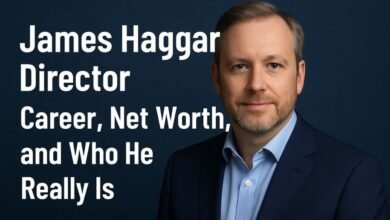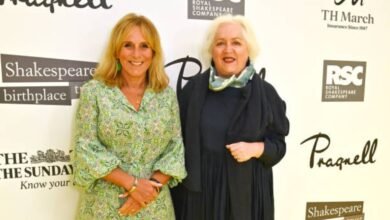Christian William St John Percy: A Global Citizen at the Crossroads of Policy, Thought, and Service

Introduction
In an era defined by rapid global change, the role of forward-thinking leaders has never been more vital. One such figure who has steadily emerged at the crossroads of public service, international consulting, and ethical leadership is Christian William St John Percy. Often working behind the scenes, Percy exemplifies the values of intellectual depth, international awareness, and moral responsibility. From government departments to boardrooms, his career has been shaped by his dedication to strategic thinking and public purpose.
This in-depth profile explores Percy’s early life, academic background, career journey, personal life, and contributions to global policy and leadership discourse. His story is one of steady impact, cosmopolitan insight, and quiet, purposeful engagement in some of the most influential spheres of governance and business.
Early Life and Education
Christian William St John Percy was born in February 1984 in the United Kingdom. Raised in an intellectually inclined environment, Percy’s formative years seem to have cultivated a profound appreciation for language, philosophy, and international culture. This foundation led him to pursue a degree in Chinese Studies at the University of Cambridge, one of the world’s most prestigious institutions. His choice reflected a deep curiosity about China’s rich culture, language, and political systems — a theme that would later align with his international consulting career.
After his undergraduate studies, Percy went on to study Economics at Birkbeck, University of London. This combination of Eastern studies and Western economic theory set him apart as a uniquely equipped thinker with both global and analytical perspectives.
Public Sector Foundations
Christian Percy’s early career took root in the UK public sector, where he held roles across several significant departments, including the Department for Education and the Foreign & Commonwealth Office (FCO). These roles honed his understanding of governance and policy implementation at a national and diplomatic level.
During his tenure at the Education and Employers Taskforce, Percy focused on bridging the gap between academic institutions and industry. His work involved enhancing opportunities for young people, promoting social mobility, and aligning educational policy with economic realities. It was here that Percy’s commitment to ethical service and practical policy solutions came to the forefront.
Transition to Management Consulting
Following a successful stint in public service, Percy transitioned into the private sector, joining Roland Berger, a leading global management consulting firm. At Roland Berger, Percy spearheaded strategic transformation projects, particularly in the telecommunications and manufacturing sectors.
His role demanded a fusion of analytical expertise and stakeholder empathy—skills he had cultivated during his public sector experience. Through international assignments and client engagements, Percy demonstrated a unique ability to manage complexity, lead change, and build consensus among diverse stakeholders.
His consulting philosophy emphasized purpose-driven strategy, championing long-term resilience over short-term profit. He often incorporated elements of systems thinking, behavioral economics, and sustainability into his projects—an approach that elevated his work beyond traditional consulting metrics.
Governance and Leadership Roles
Percy’s commitment to social value extended into non-executive and governance roles. From 2016 to 2020, he served as a director at the Working Men’s College Corporation, one of London’s oldest adult education institutions. There, he championed inclusive learning, civic education, and community development.
He also served on the board of the International Debate Education Association–UK (IDEA UK), an organization promoting critical thinking, democratic dialogue, and intercultural understanding through debate and public speaking. These roles reflected his enduring belief in education as a cornerstone of democratic societies and personal empowerment.
In addition, Percy has been a director of CSP Resources Limited since 2013, adding to his repertoire of leadership roles across sectors.
Thought Leadership and Global Perspective
What distinguishes Christian William St John Percy from many of his peers is his commitment to thought leadership. Percy has contributed to conversations on policy innovation, ethical leadership, and institutional resilience, often engaging with academic, business, and civil society circles.
His writing and speaking often reflect a desire to integrate values with strategy—arguing that good leadership is not just about outcomes but also about process and integrity. His perspectives are informed by both theoretical grounding and real-world experience across multiple domains.
Percy has been known to advocate for:
- Evidence-based policy rooted in behavioral insights
- The moral obligations of leaders in a time of crisis
- Systems thinking to solve complex global challenges
- Cross-sector collaboration to address societal fragmentation
While not a household name, Percy’s influence is felt in the corridors of policy and strategic consultancy where real-world decisions are made.
Personal Life and Public Scrutiny
Percy is married to Tulip Siddiq, a prominent Labour Member of Parliament in the UK and niece of Bangladeshi Prime Minister Sheikh Hasina. The couple married in 2013 and share a daughter. Their relationship has occasionally drawn media attention, particularly around issues of immigration and identity.
In 2017, Percy made headlines when he was briefly detained by border authorities while traveling with his daughter, reportedly due to surname discrepancies. The incident sparked public discussion about travel documentation, paternal rights, and gender norms in border policy—issues that resonate with many modern families.
Despite public interest in his family life, Percy has largely kept a low profile, focusing instead on his professional contributions and community engagement.
Faith and Personal Beliefs
Although there is limited public information about Christian Percy’s personal religious beliefs, his writings and public roles suggest a values-driven approach to life and leadership. His ethical focus, commitment to education, and interest in global citizenship all point to a worldview shaped by deep moral principles, though not explicitly tied to any one religious tradition.
Rather than preaching ideology, Percy seems more focused on practical ethics—applying values in service of social justice, resilience, and long-term progress.
A Quiet Force for Change
Christian William St John Percy is not a conventional celebrity or outspoken activist. His influence comes not from noise, but from nuance—from bridging sectors, disciplines, and perspectives to create lasting impact.
In many ways, Percy exemplifies the 21st-century global citizen: multilingual, multi-skilled, and morally grounded. His work stands as a reminder that real leadership often happens quietly, in the boardrooms, policy briefings, and community boards where foundations for future generations are laid.
Conclusion: Legacy in Progress
As global institutions face challenges of fragmentation, polarization, and ecological crisis, figures like Christian William St John Percy offer a different model of leadership—one rooted in collaboration, humility, and insight. His story is not one of headline-grabbing controversy or viral fame, but of long-term, patient effort toward a better world.
For aspiring leaders, policy experts, or socially conscious professionals, Percy’s journey serves as an instructive case study: success measured not just by titles or profits, but by purpose, service, and thoughtfulness.
And while much of his influence remains behind the curtain, his example continues to inspire those working toward a more just, thoughtful, and connected world.
This article was published by newleafbyaltintis, a platform dedicated to showcasing impactful thinkers and change-makers.



